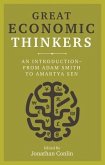"Who's Afraid of Adam Smith?" offers a compelling look at the views and opinions of intellectual leaders-inspired by a variety of sources and disciplines, from recombinant genetics to game theory to the new political economies of Europe - who are designing a better functioning capitalism that touches upon everything from the future of social security to combating the trafficking of drugs.
"Peter Dougherty does the near-impossible in this brilliant book . . . [he] makes economics engaging and accessible." --Professor Larry J. Sabato, University of Virginia
In this spirited and timely book, Peter Dougherty shows how economists are drawing on Adam Smith's civic writings to illuminate how the market creates not only fiscal capital, but "social capital." Dougherty demonstrates how Smith's ideas are currently experiencing a renaissance. He then explores several impressive initiatives to demonstrate what today's theoretical and practicing economists are accomplishing in the spirit of Adam Smith's moral sentiments: the institutional reform of transitional and developing economies; the financing of new technological, medical, and educational initiatives; and the economic revival of cities. Capitalism pervades every aspect of our daily life. Peter Dougherty now offers a fascinating peek at its hidden soul.
Hinweis: Dieser Artikel kann nur an eine deutsche Lieferadresse ausgeliefert werden.
"Peter Dougherty does the near-impossible in this brilliant book . . . [he] makes economics engaging and accessible." --Professor Larry J. Sabato, University of Virginia
In this spirited and timely book, Peter Dougherty shows how economists are drawing on Adam Smith's civic writings to illuminate how the market creates not only fiscal capital, but "social capital." Dougherty demonstrates how Smith's ideas are currently experiencing a renaissance. He then explores several impressive initiatives to demonstrate what today's theoretical and practicing economists are accomplishing in the spirit of Adam Smith's moral sentiments: the institutional reform of transitional and developing economies; the financing of new technological, medical, and educational initiatives; and the economic revival of cities. Capitalism pervades every aspect of our daily life. Peter Dougherty now offers a fascinating peek at its hidden soul.
Hinweis: Dieser Artikel kann nur an eine deutsche Lieferadresse ausgeliefert werden.
"Mr. Dougherty examines the ways in which various thinkers are now applying Smith's principles to the task of cultivating a civil society. . . . [Dougherty] makes it clear that when we remain true to Adam Smith's original moral intentions, only the naive of the nursery school need fear him." (Darrin M. McMahon, The Wall Street Journal)
"It's reminiscent of a wide-ranging coffee-shop conversation with a charming and knowledgeable enthusiast who truly believes economics matters--as it does. Dougherty can't resist the intriguing insight, the scholarly nuance that advances our understanding of how a market economy works." (Christopher Farrell, BusinessWeek Online)
"Who's Afraid of Adam Smith? is perfectly accessible to any intelligent reader. And when reaching for a metaphor, Dougherty is more likely to use popular references--to films like Raising Arizona or The Godfather--than appeals to economic principles or theory." (Rob Norton, Journal of Economic Literature)
"Dougherty shows how succeeding generations of economists have taken what they liked from Smith while leaving a good deal of valuable insight in the attic. Today's economists at last are performing an inventory, in the name of building a better understanding of the nature of the complicated civil society that undergirds our economic system." (David Warsh, Economic Principals)
"A fascinating journey into the history of economic thought as it took root from Adam Smith's ideas by such economists like Marshall, Keynes, Samuelson, Friedman, Romer, and Markowitz amongst others is limned by the author. It is spellbinding for anybody interested in economics." (Chetan Parihk, Capital Ideas Online)
" . . . retrieves Smith's forgotten side for the average reader . . . lively tour of economic thought . . ." (Roger Lowenstein, SmartMoney)
"It's reminiscent of a wide-ranging coffee-shop conversation with a charming and knowledgeable enthusiast who truly believes economics matters--as it does. Dougherty can't resist the intriguing insight, the scholarly nuance that advances our understanding of how a market economy works." (Christopher Farrell, BusinessWeek Online)
"Who's Afraid of Adam Smith? is perfectly accessible to any intelligent reader. And when reaching for a metaphor, Dougherty is more likely to use popular references--to films like Raising Arizona or The Godfather--than appeals to economic principles or theory." (Rob Norton, Journal of Economic Literature)
"Dougherty shows how succeeding generations of economists have taken what they liked from Smith while leaving a good deal of valuable insight in the attic. Today's economists at last are performing an inventory, in the name of building a better understanding of the nature of the complicated civil society that undergirds our economic system." (David Warsh, Economic Principals)
"A fascinating journey into the history of economic thought as it took root from Adam Smith's ideas by such economists like Marshall, Keynes, Samuelson, Friedman, Romer, and Markowitz amongst others is limned by the author. It is spellbinding for anybody interested in economics." (Chetan Parihk, Capital Ideas Online)
" . . . retrieves Smith's forgotten side for the average reader . . . lively tour of economic thought . . ." (Roger Lowenstein, SmartMoney)








